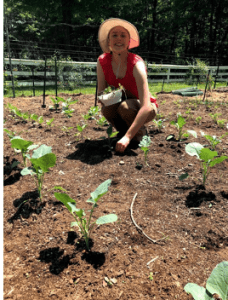 Rising unemployment in the pandemic has exacerbated food insecurity for many individuals. In response to our pledge of “hands to larger service,” 4-Hers have joined with members of the Fairfield community to grow produce for local food banks.
Rising unemployment in the pandemic has exacerbated food insecurity for many individuals. In response to our pledge of “hands to larger service,” 4-Hers have joined with members of the Fairfield community to grow produce for local food banks.
As a Fairfield County 4-H senior with interests in natural sciences and community service, I was excited to merge my passions through volunteering at the Fairfield Garden for Food Banks. When I began my first job of leaf removal and planting, I wore my 4-H Fair t-shirt (in addition to a face mask). I soon discovered that the organizer of the project, Sharon Brodeur Pistilli, was a 4-H alumna, formerly of the Bethlehem Busy Stitchers! This connection was no coincidence, as 4-H shapes individuals with a lifelong passion for healthy living and giving back through service.
With Sharon’s energetic leadership, many others have joined the Fairfield Garden for Food Banks Initiative.
Over the past month, the group has planted kale, lettuce, pole beans, tomatoes, peppers, cucumbers, broccoli, eggplant, squash, radishes, and carrots. Sharon Pistilli organized donations of seedlings and gardening supplies. A Fairfield resident graciously offered her garden space. Over a dozen volunteers have helped with weeding, daily watering, and harvesting while maintaining social distancing guidelines.
On June 24, I had the chance to see the culmination of the group’s hard work, with a delivery of four gallon-size bags of fresh lettuce, three bags of kale, and radishes to Operation Hope in Fairfield. Other recipients will include Semilla Collective in New Haven and nOURish Bridgeport, which provide food to clients either in a Community kitchen or food bank capacity.
Volunteering at the garden has brought community to my life at a time when I would have otherwise felt isolated and disconnected. As I dig into soil and place seeds in the ground, I can reconnect with nature and the world around me. Creating a mound around each squash plant, which 4-H Alumna Sharon Pistilli calls a “dirt-hug,” is an opportunity to give my community a hug: to reach out to insecure families and invest both my hands and heart in larger service.
The Fairfield Garden for Food Banks is an example of how the 4-H Program nourishes the individual and fosters community. 4-Hers of multiple generations have partnered with volunteers and food banks, growing fresh produce to respond to a growing need. While apart, we have come together to maintain a garden, and in doing so, nurture our pledges to one another.
Article by Harper Treschuk, Fairfield County 4-H Member